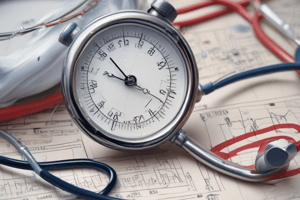Podcast
Questions and Answers
Match the following chief complaint components with their descriptions:
Match the following chief complaint components with their descriptions:
Present health concern = The issue that brings the person to the hospital Past history = Detailed summary of past health and known allergies Family history = Information about age and health status of relatives Review of systems = Overview of general health and symptoms related to body systems
Match the following health history components with their descriptions:
Match the following health history components with their descriptions:
Present health concern = Current disease or problems of the patient Past history = Summary of past health, immunization status, known allergies, and chronic disorders Family history = Age and health status of relatives, or age and cause of death Review of systems = Overview of general health and symptoms related to each body system
Are vital signs useful in detecting or monitoring medical problems?
Are vital signs useful in detecting or monitoring medical problems?
True (A)
Match the following physical examination techniques with their descriptions:
Match the following physical examination techniques with their descriptions:
Is blood pressure considered one of the four main vital signs routinely monitored by medical professionals and health care providers?
Is blood pressure considered one of the four main vital signs routinely monitored by medical professionals and health care providers?
Is pain considered as one of the other vital signs?
Is pain considered as one of the other vital signs?
Is temperature considered as the degree of internal heat of a patient's body in nursing?
Is temperature considered as the degree of internal heat of a patient's body in nursing?
Is temperature defined as the measure of hotness or coldness expressed in terms of any of several scales?
Is temperature defined as the measure of hotness or coldness expressed in terms of any of several scales?
Should vital signs be recorded before/after invasive procedures, certain medications, and nursing interventions?
Should vital signs be recorded before/after invasive procedures, certain medications, and nursing interventions?
The body temperature range for a normal person is 37.0 - 37.6o C.
The body temperature range for a normal person is 37.0 - 37.6o C.
The forehead is a site for measuring axillary temperature.
The forehead is a site for measuring axillary temperature.
Tympanic thermometer is a type of glass thermometer.
Tympanic thermometer is a type of glass thermometer.
Stress does not affect body temperature.
Stress does not affect body temperature.
Flashcards are hidden until you start studying
Study Notes
Human Needs
- Physiological needs: oxygen, water, food, temperature, shelter, clothing, elimination, sleep, activity, and sex
- Psychological needs: self-esteem, feelings of security, happiness, sadness
- Sociocultural needs: feelings of belonging, relationships
- Intellectual needs: thinking, learning
- Spiritual needs: being connected to others, having a sense of purpose
Health Assessment
- Purpose: identify phases of patient's physical, psychological, and emotional state that indicate a need for nursing care
- Requires: use of vision, hearing, touch, and smell, and appropriate interview skills and techniques
Role of Nurse in Health Assessment
- Obtaining patient's health history
- Performing a physical assessment
Health History
- Purpose: determine individual's state of wellness or illness
- Best conducted as part of a planned interview
- Personal dialogue between patient and nurse to obtain information
- Contents:
- Biographical data: name, address, age, gender, marital status, occupation, and ethnic origins
Studying That Suits You
Use AI to generate personalized quizzes and flashcards to suit your learning preferences.





